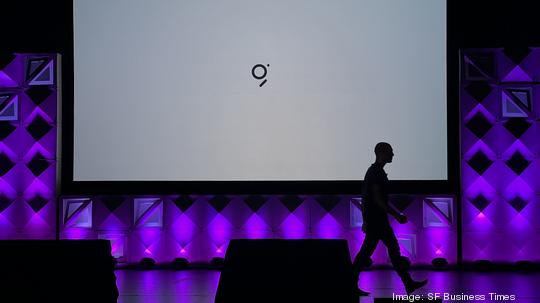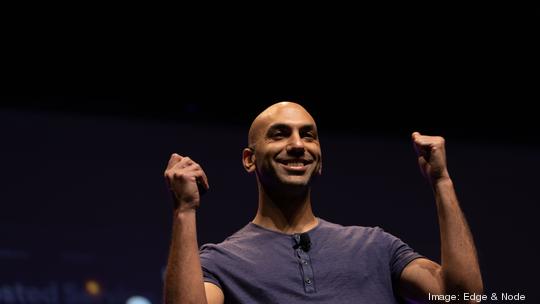
Hundreds of Web3 developers and investors converged in San Francisco on Thursday to discuss the future of decentralization at a conference called Graph Day.
The event was organized by a San Francisco company called Edge & Node, which is building what it calls The Graph, a decentralized search engine overseen by The Graph Foundation that will allow people to quickly search through a myriad of data flowing along blockchains like the ethereum network.
Still with me? You’re doing great.
The most famous blockchain is the bitcoin network, which people use to “mine,” store and verify transactions of bitcoin, the world’s first known cryptocurrency. But other so-called blockchain protocols have been developed in the years since the first bitcoin was minted in 2009. Among the newer ones are ethereum, solana and polkadot.
What they all have in common is some form of decentralization. Instead of a single entity, like Facebook or Microsoft, controlling our data on its own centralized servers, a decentralized protocol spreads out the ownership and control of data.
Web3 evangelists say that decentralization is the future of the internet. That it will democratize data and allow people to take back control of their personal, digital information. And that the technology even has the power to help solve some of our most pressing challenges like climate change, homelessness and dysfunctional government.
But all tools and systems created by humans are flawed. We unconsciously bake our biases into artificial intelligence algorithms. And as much as social media has been a force for enabling social movements and democratizing communications, it has also been used a tool for terrorism, hate, harassment and fraud.
Web3 is still in its early days, but it encompasses everything from cryptocurrency to decentralized autonomous organizations (DAOs) to nonfungible tokens (NFTs). The so-called metaverse will incorporate some of these elements as well, though it won’t be completely decentralized with corporations like Facebook’s parent company, Meta, controlling large swaths of it.
There have already been some bumps, and critics consider many Web3 projects to be scams.
A 28-year-old software engineer in Massachusetts, Molly White, is documenting these early scams, failures and setbacks in a blog called Web3 is Going Just Great. The Washington Post profiled White in May, and recent headlines from her blog include:
- FTC reports $329 million lost to crypto scams in Q1 2022
- Renter loses half their security deposit after landlord puts it into Bitcoin
- Collector sells Bored Ape for $513,000 less than they paid for it

Proponents of Web3 see a longer-term future that's full of promise.
Over the course of nine hours from the Palace of Fine Arts, the Graph Day conference touched on the potential power of decentralization and various related topics from civic engagement to meritocracies and venture capital to data and development.
Here are eight of the most interesting quotes that I heard during the conference:
- "The impact of The Graph should be millions of people, and we really want to get there." —Eva Beylin, director of The Graph Foundation
- "For years people have told us that there was no way to build a decentralized network that can be as fast and efficient as a centralized service, and we proved them wrong." —Yaniv Tal, CEO of Edge & Node
- "We can have protocols for every single mission from combating climate change to ending homelessness. We believe that humanity can solve any challenge with the right incentives and coordination tools." — Tal
- "We need each other and if we work together we can make things better while navigating reality. We're about to enter a period of change. There are gonna be those that try to use this opportunity to exact vengeance on those they think are responsible for their pain. They'll call these people oppressors and seek revenge. When you hear those calls, be a voice of reason. We can't fix things by punishing those that came before. Now, we make things right by building a better system and bringing everyone with us. There's more than enough in this world of abundance for everyone. In the pages of Geo, on The Graph, we can see a blueprint for a better world. But here's the thing: the pages are blank. It's up to you to fill them out. Fill them with your knowledge. Color them in with your dreams. Design the world you want to live in. And if we onboard enough people, we can make it so. There's a lot we have to unlearn. Many of the ideas of the past are no longer going to serve us where we're going. We have to evolve and view things through fresh eyes. Our only limits are our imagination, physics and human nature. So much is possible now. So get ready. We're embarking on a journey, a wonderful adventure where the light of humanity can flourish to new heights. And it's all happening now." — Tal
- "Web3 is as much about being a meritocracy as it is about being open source, permissionless, decentralized and trustless. If there is no meritocracy, it should be a warning sign in the same way that when you see centralization that is a warning sign. And that's because we need to create true value in this ecosystem, and when you create that true value, you're rewarded." — Tegan Kline, business lead at Edge & Node
- "We generally use the word scammer to identify lack of merit, right? I'm not going to name names here… Oftentimes it's when projects or people have clout without creating the value for that clout… A meritocracy gives credit where credit is due." — Kline
- "Isn't a hack just a bug bounty? We have the infamous example of The DAO hacker of Ethereum that got away with $11 billion… they used the smart contract just the exact way the smart contract was programmed. And so you can make the argument that the hacker deserves it if you believe that code is law." — Kline
- "I work mostly on the early-stage venture side… it doesn't really feel like a bear market. There's more investors than ever. There's more founders than ever. There's more infrastructure than ever to start taking things to market… there's a lot of web2 founders coming in, for sure. Some of the reasons that they're comfortable coming in now is because they're seeing new and traditional venture capital taking the crypto space a lot more seriously." — Jake Brukhman, founder and managing partner at CoinFund, a crypto-focused VC firm








